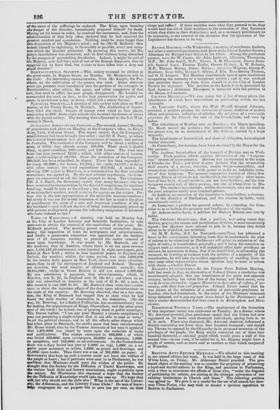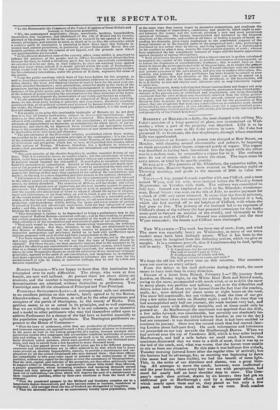BRISTOL ANTI■REFORBI MEETING.—We alluded to this meeting in our second
edition last week. It was held in the large room of the White Lion, on Friday. Mr. Alderman Daniel presided. The pro- fessed object of the meeting was to consider the propriety of presenting a loyal and dutiful address to the King, and petitions to Parliament, with a view to counteract the efforts of those who, "under the disguise of petitioning for reform, are aiming at the ultimate subversion of our existing institutions in Church and State." The following petition was agreed to. We give it as a model for the use of all stanch but deco- rous Ultra-Tories, who may wish to muster a specious opposition to Reform in Parliament. " To the Honourable the Commons of the United Kingdom of Great Britain and Ireland, in Parliament assembled.
" We, the undersigned magistrates, clergy, merchants, bankers, householders, freeholders, free burgesses, and inhabitants of the city of Bristol and its vicinity, alarmed at the dangers to which the country is exposed by the spread of Revolu- tionary principles, and anxious to avert, as much as in us lies, the calamities which a reckless spirit of innovation is labouring to draw down upon this hitherto fa- voured land, entreat permission, in preferring to your Honourable House this our humble petition, to state the reasons of our appeal, and the grounds upon which our apprehensions are founded.
" In the present disturbed state of the country, when every artifice is practised to inflame the passions of the people, and to diffuse discontent and dissatisfaction through the land, to which a licentious press has but too successfully contributed, we consider it to be our duty, as loyal subjects, to raise our warning voice against that fatal error—fatal, indeed, if it should prevail within the walls of Parliament— which would lead to the belief that a popular clamour, thus industriously excited, for Revolutionary innovations, under the pretext of Reform, expresses the sense of the nation.
"From the public meetings which have of late been holden for this purpose, as
well as from those convened for voting congratulatory addresses on successful Revo- lution abroad, the loyal and thinking classes of society have for the most part stu- diously absented themselves ; such proceedings, whatever might be the views of the promoters, having a manifest tendency to the encouragement of discontent, the dis- turbance of the public peace, and, in their ultimate consequences, to the destruction of the balance of power vested by the constitution in the three branches of the Legis- lature, upon which depends the preservatiod of our rights and liberties as subjects. "To our admirable form of Government, as composed of King, Lords, and Com- mons, we are, from every feeling of principle and conscience, devotedly attached ; convinced that, of all political systems ever planned by human wisdom for insuring the rights, the liberties, and the general happiness of the subject, it is the most per- fect and complete. " But greatly as we prize this inestimable birthright of Britons, we do not deny that it is, like all human institutions, subject to abuses and imperfections. Such defects, as they arise, it is our desire to see corrected. This, however, should be effected with caution, and in the spirit of the constitution ; all rash and ignorant attempts at improvement we deprecate, as endangering the whole fabric of our go- vernment; and above all, we deprecate those theoretical and speculative innova- tions in the constitution, which, by the introduction of new elements therein, would be destructive of its very form and character. " The pre-eminence of the Protestant religion, established within these realms, we consider to be a main and essential principle of the constitution ; it is the basis of the national morals, and the prime source, under Heaven of the superior degree of civilization and prosperity which has so long distinguished this country above all the nations of Europe. Whatever, therefore, has a tendency to depress or weaken that pre-eminence, will ever receive our determined and uncompromising opposition. The open exercise of the elective franchise is another essential feature of our laws. That it is subject to abuse, we readily admit ; but the substitution of vote by ballot, so far from operating as any remedy against bribery and corruption, it Is easy to perceive would increase the evil tenfold. It would give to treachery and false- hood the protection of concealment. Instead of the present open and manly exer- cise of the proudest privilege of the subject, would be substituted the dark and se- cret machinations of conspiracy anti cahal,—a mode of proceeding not less rep ug- nant to the feelings of free men, than opposed to the spirit of the constitution, and leading, in the end, to a most degrading and fatal change in the national character. " Intimidation is another objection which has been prominently brought forward in the outcry against our representative system. That it exists to any considerable extent, we utterly disbelieve. The character of Britons, and the shame and odium attendant upon flagrant acts of oppression, are the best security against its general prevalence. The influence which the possession of rank or property naturally gives over tine regards and attachment of those to whom it affords the means of employ- ment and subsistence, so for from being an evil in itself, is one of the surest tests of the sound moral state of society ; and that, surely, would be a miserable policy,' which, with the view of remedying a partial abuse, woold sever those ties of mutual protection and dependence which, uniting the upper and lower classes of society in a bond of kindly and affectionate connexion, form the best safeguard of social order ; and this, we submit, would be the inevitable effect of any enactment esta- blishing the vote by ballot.
" This innovation is further to be deprecated as being it preliminary step to the next object of Radical Reform—universal suffrage ; and as thus tending, by gradual but certain progression, to the final consummation of the work of destruction,—a total subversion of the monarchical and aristocratical parts of our constitution. "That such would be the issue of these democratical innovations, the evidence of all history attests. Our duty, therefore, to our King, our attachment to the two Houses of Parliament, and our jealous anxiety to preserve inviolate their respective prerogatives and privileges, forbid us to look with indifference upon changes pregnant with such fearful and fatal consequences to the state. " For these reasons, in the memorable words of our ancestors, brit in the quali- fied sense already explained, we will not that the laws of England should be changed.' For these reasons, we most earnestly implore that in the measures to be adopted for effecting any amendments in our representative system, which lapse of time or a change of circumstances may render expedient, the utmost care may be taken, by your Honourable House, to avoid the admission of any novel anti visionary principles, opposed to the spirit of our constitution, and dangerous to its stability. And more especially we pray, that all attempts to introduce any new laws for the establishment of vote by ballot, or universal suffrage, may be met by a firm and decisive rejection."



























 Previous page
Previous page